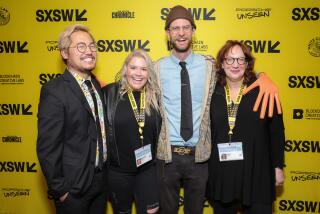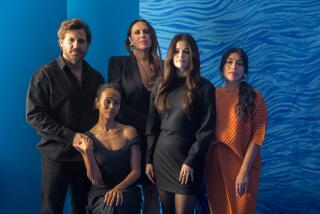The quieter side of Gene Wilder
Dear Gene Wilder,
Please come back to the movies. We miss the crazy antics we fell in love with in “Willy Wonka and the Chocolate Factory” and in the classic Mel Brooks comedies “The Producers,” “Young Frankenstein” and “Blazing Saddles.” We miss your romanticism. And we miss your expressive face, unruly hair and bright blue eyes.
Please come back.
--
Alas, the prospects of that happening are slim. So Wilder fans will have to settle for a taste of the 74-year-old comic genius on Turner Classic Movies’ “Role Model,” which airs at 8 p.m. Tuesday. He sits for an affectionate one-hour conversation with one of his biggest fans, Alec Baldwin.
Shot at the expansive Waveny House in New Canaan, Conn., near Wilder’s home, the two chat about his brief marriage to Gilda Radner, who died of ovarian cancer in 1989; his current wife of 16 years, Karen; the night he and Brooks met; working on his first screenplay for 1974’s “Young Frankenstein,” which was nominated for an Oscar; and his complex relationship with frequent co-star Richard Pryor.
TCM also will screen three of Wilder’s best: 1968’s “The Producers,” 1974’s “Blazing Saddles” and 1970’s “Start the Revolution Without Me.”
Just don’t hold your breath about seeing him in a film again.
Wilder confesses in the program that he doubts he’ll ever act again. He reiterated the belief in a telephone interview.
He offered the caveat that he might be persuaded if he got a script where “the bell goes off and you say, ‘I have to do this.’ If it did, I would. But I don’t expect that it ever will.”
And for a good reason. He doesn’t like contemporary comedies that stress profanity over humor -- “the things they think are going to make it commercial -- and, tragically, sometimes they are right,” he explains. “Even if the plot sounds interesting, the script is terrible. That’s why I’m not doing movies.”
Wilder, who reports that he is in complete remission from the non-Hodgkin lymphoma with which he was diagnosed in 1999, hasn’t made a movie since 1991. Except for a short-lived TV series for NBC in the mid-’90s and a few guest shots on “Will & Grace,” he has left Hollywood behind.
He lives in Connecticut, where he writes books, including his best-selling autobiography, “Kiss Me Like a Stranger.”
“The title I got from Gilda three weeks before she died,” Wilder says quietly. “She came into the living room in her robe and said, ‘I have a title for you. Maybe you can use it some day.’ I didn’t know what she was talking about. Then she died, and 14 years later. . . .”
His second novel, “The Woman Who Wouldn’t,” was recently published. “It’s a love story, and some of it is funny, some of it is sad, most of it is very romantic.”
Wilder and Baldwin had met a few years back in an airport lounge in New York. They immediately hit it off. “I liked his humor and his intelligence,” Wilder recalls. “When this came along several years later, I wasn’t sure. I don’t like usually doing things like this. But when I heard it’s Alec Baldwin, I said, ‘OK. I’ll do it.’ ”
Baldwin was a teenager when he first saw Wilder as the drunken gunslinger the Waco Kid in “Blazing Saddles.” He thinks Wilder’s best performance, however, is as the manic Frederick Frankenstein in “Young Frankenstein.”
“ ‘Young Frankenstein’ is an acting lesson in comedy because he plays it so straight,” Baldwin says. “When you play it straight and you don’t repeat yourself, you can segue [from comedy] into a really substantial and legitimate dramatic career. He could have been a wonderful dramatic actor if he cared to.”
Wilder, Baldwin discovered, possesses a “strange kind of Buddhist quality” because he was willing to walk away from movies.
“It wasn’t like the business was done with him,” he says. “He was done with them. There is something about people who decide to do that. A friend of mine lent me this phrase a long time ago: ‘Would you rather live it in life or live it on screen?’ Some people would rather live in their lives and have their lives be private. They don’t feel like the richest moments are going to play on screen. I really admire people like that. They take a piece of their life for themselves.”
--
More to Read
Only good movies
Get the Indie Focus newsletter, Mark Olsen's weekly guide to the world of cinema.
You may occasionally receive promotional content from the Los Angeles Times.








